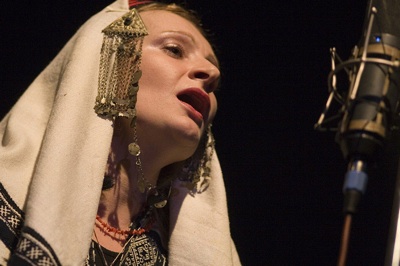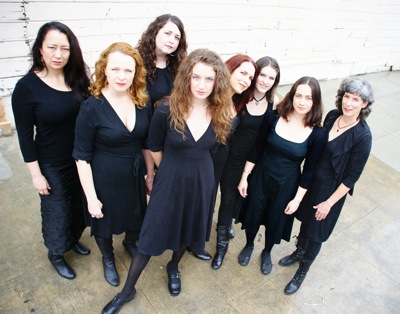
Ancient Song
As a five-year-old child watching TV, singer Svetlana Spajic saw a program on agriculture in her native Serbia. Although she had been to the villages of her grandparents, she heard something unlike anything she had ever heard before: the songs of the villagers. “It was something,” she says, with an air of disbelief, “I couldn’t identify as singing.”
The memory stuck with her and laid the foundation for the passion she felt later as a teenager, when she heard women’s choral singing broadcast over Radio Belgrade. At that moment she decided she would be a singer of the music that so moved her that it became “a kind of fever.” Her journey, which began by listening to the field recordings of ethnomusicologists, later moved to Serbian and Bosnian villages, where she enticed her “grandmothers” to sing for and with her.
This past Sunday, Spajic brought her deep love of village singing to the Bay Area, leading a seminar on Serbian folk singing, under the auspices of Kitka, at the Musically Minded Academy in Oakland. In three performances, January 27, 28, 29, she will join the Bay Area’s own Kitka in concert performances that will reveal and celebrate the beauty of this very ancient and primal form of singing.
Singing far from home …
California is a long way from Serbia, but the sounds that are recognizable as Eastern European vocal music have been appreciated here for decades. Founded in 1979, Kitka began as a group of amateur singers from diverse backgrounds who met regularly to study and sing the close harmonics that give a dissonant edge and resonant vibrancy to this a cappella choral music. It’s been many years since the singers of Kitka could call themselves amateurs, their performance quality has grown and flourished as has its reputation and its national and international presence.
In the past decade or so, the group has expanded its interests, experimenting with how to weave these compelling vocal te
chniques into contemporary settings and themes. Most recently, in 2009, Kitka premiered Dan Cantrell’s Rootabaga Opera, with texts by Carl Sandburg, in collaboration with shadow puppet artists Larry Reed and Christine Marie of Shadowlight Productions, and in June of 2010, Kitka collaborated with composer/music director Mariana Sadovska, and German stage director Andre Erlen to create Singing Through Darkness, a vocal-theater work inspired by historical and contemporary songs and stories of wartime. This year Kitka will embark on a new collaborative adventure with multi-disciplinary artist Meredith Monk.
Spajic is also involved in placing the singing she loves in a contemporary setting. In 2011 she participated in The Life and Death of Marina Abramović at the Manchester International Festival. The piece, with Marina Abramović, was directed by the American avant-garde stage director Robert Wilson.
 And this, perhaps, was the message of Svetlana Spajic’s presentation: that the culture that created this form of singing—untempered a cappella singing with no fixed intonation and shifting rhythmic bases—is quickly disappearing. And with it will vanish its intimate understandings of the voice in which sound, words, and singers are bound into a single entity. The form thrives on a lack of self-consciousness and a kinship of emotional narrative.
And this, perhaps, was the message of Svetlana Spajic’s presentation: that the culture that created this form of singing—untempered a cappella singing with no fixed intonation and shifting rhythmic bases—is quickly disappearing. And with it will vanish its intimate understandings of the voice in which sound, words, and singers are bound into a single entity. The form thrives on a lack of self-consciousness and a kinship of emotional narrative.
It was moving to watch the visual recordings of Spajic’s interactions with the elderly villagers of Serbia. The intensity of the interaction between the singers is clearly portrayed. The sung tones are often sustained, during which each singer has the chance to listen carefully and constantly adjust to the other’s sound: the “lead” singer shifting the tone slightly, and the “drone” blending with those decided shifts. The message is that of closeness and community.
Many of the singers that Spajic recorded had long ago forsaken their singing. An especially poignant scene was that of Milanka Ivanovic, a round-faced, nearly toothless 90-year-old who had abandoned her music for almost 40 years. After singing a short piece with Spajic, she leaned back and exclaimed, “Let’s open the window, so everyone hears that Milanka is singing again.”
—Jaime Robles
To hear the sounds of Milanka and her soulmates, join Svetlana Spajic and Kitka for their concerts, To the Singers of Tales: Kitka in Concert with Svetlana Spajic. CounterPulse, 1310 Mission St. (at Ninth), San Francisco. Friday, January 27 through Sunday, January 29, all performances at 8 p.m. $17, $22. http://www.kitka.org/calendar/index.html.
Photos: Svetlana Spajic (above); Kitka (below) Photo by Peter Ellenby
